Abstract
OBJECTIVES: This study examined associations between blood pressure and self reported experiences of racial discrimination and responses to unfair treatment. METHODS: Survey data were collected in year 7 (1992/93) of the Coronary Artery Risk Development in Young Adults (CARDIA) study, a prospective multisite community-based investigation. Participants included 831 Black men, 1143 Black women, 1006 White men, and 1106 White women 25 to 37 years old. RESULTS: Systolic blood pressure among working-class Black adults reporting that they typically accepted unfair treatment and had experienced racial discrimination in none of seven situations was about 7 mm Hg higher than among those reporting that they challenged unfair treatment and experienced racial discrimination in one or two of the situations. Among professional Black adults, systolic blood pressure was 9 to 10 mm Hg lower among those reporting that they typically challenged unfair treatment and had not experienced racial discrimination. Black-White differences in blood pressure were substantially reduced by taking into account reported experiences of racial discrimination and responses to unfair treatment. CONCLUSIONS: Research on racial/ ethnic distributions of blood pressure should take into account how discrimination may harm health.
Full text
PDF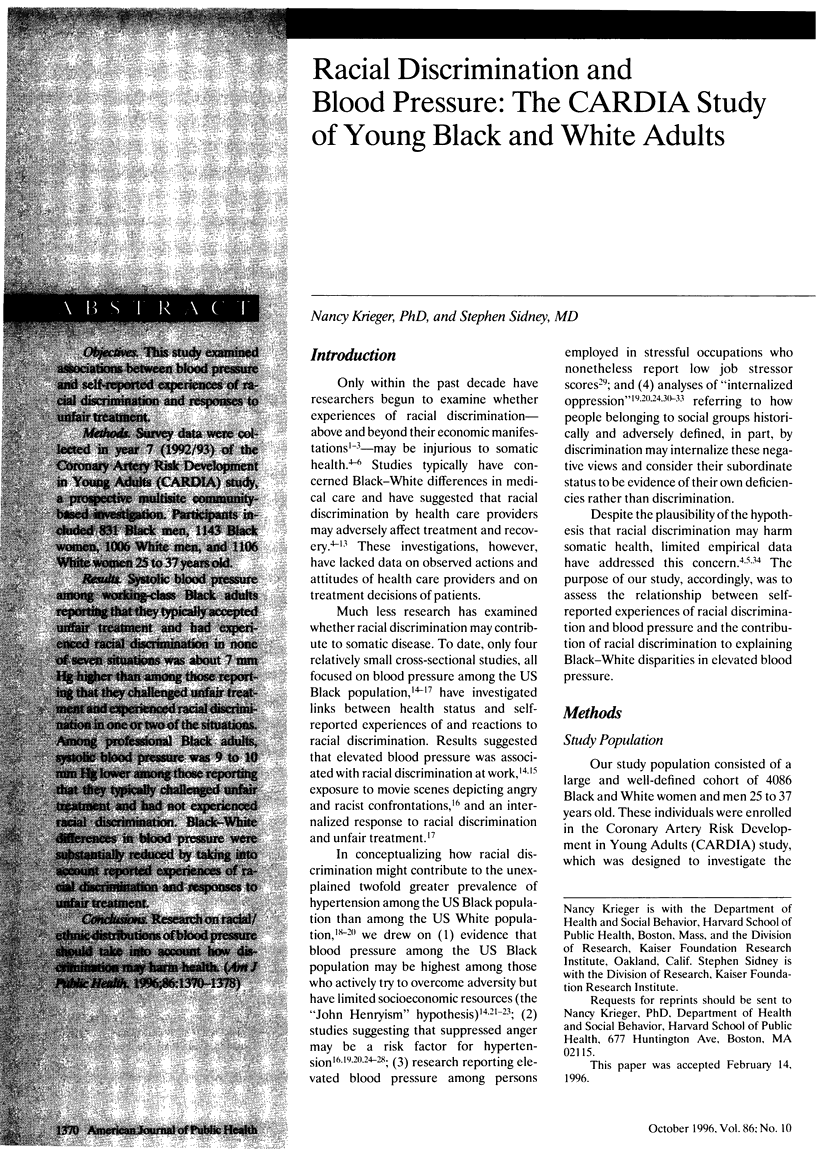
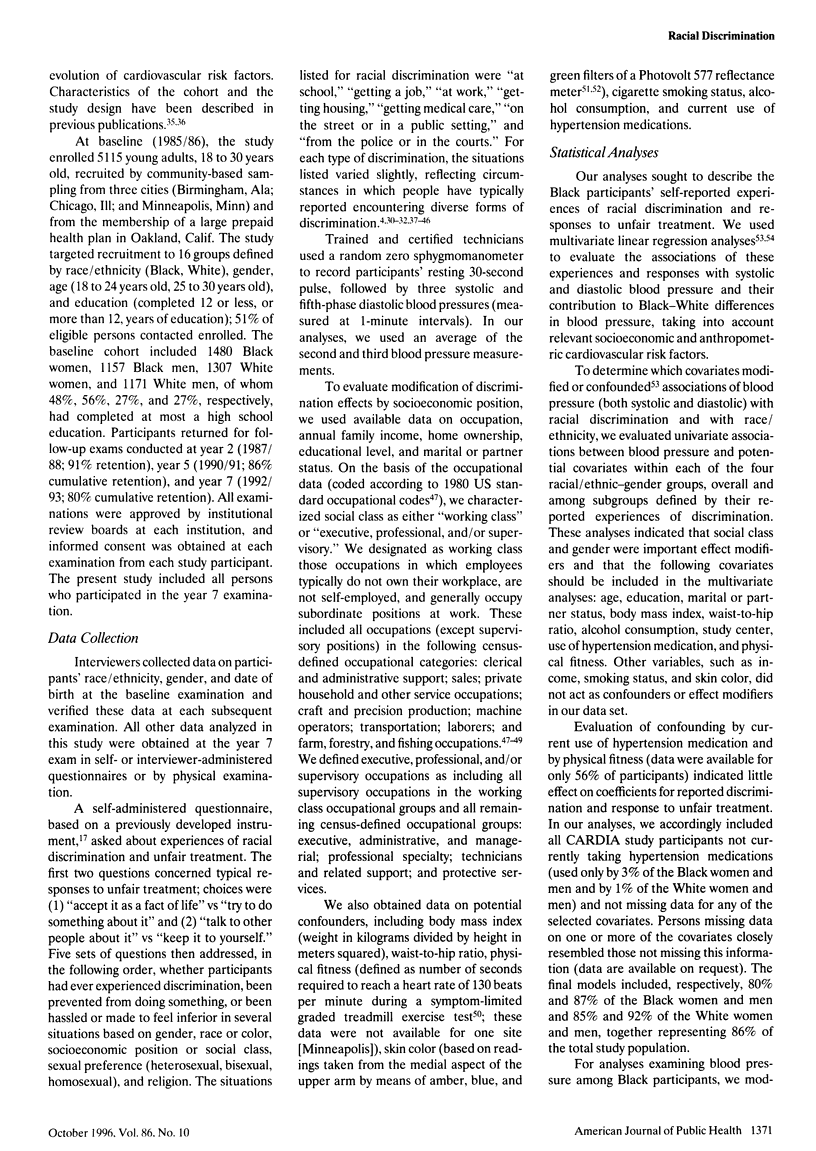
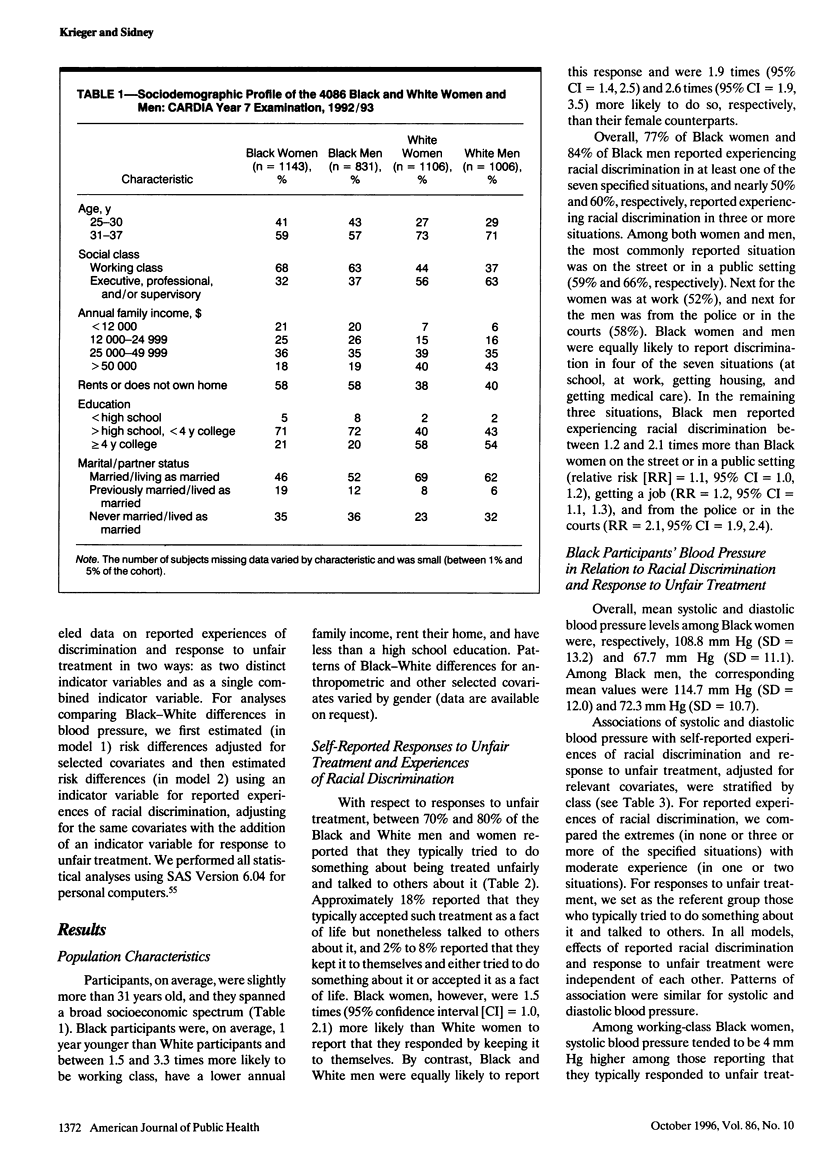
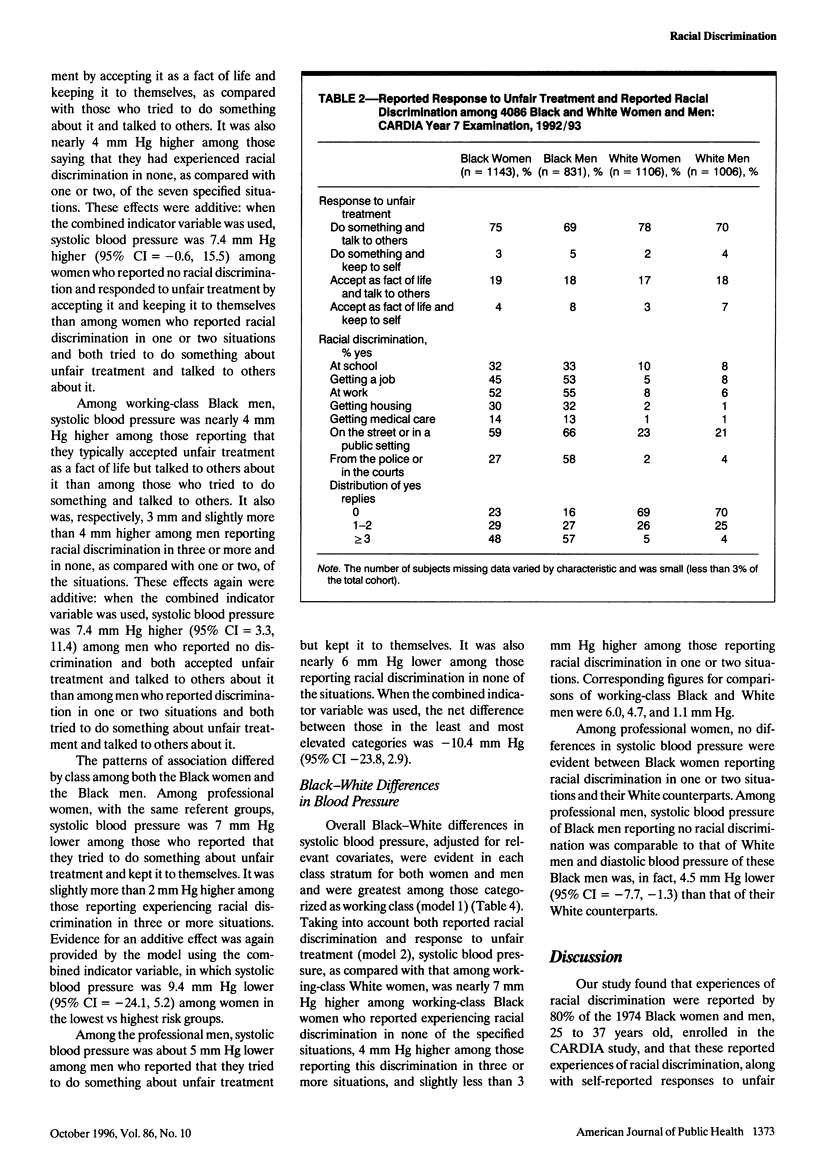
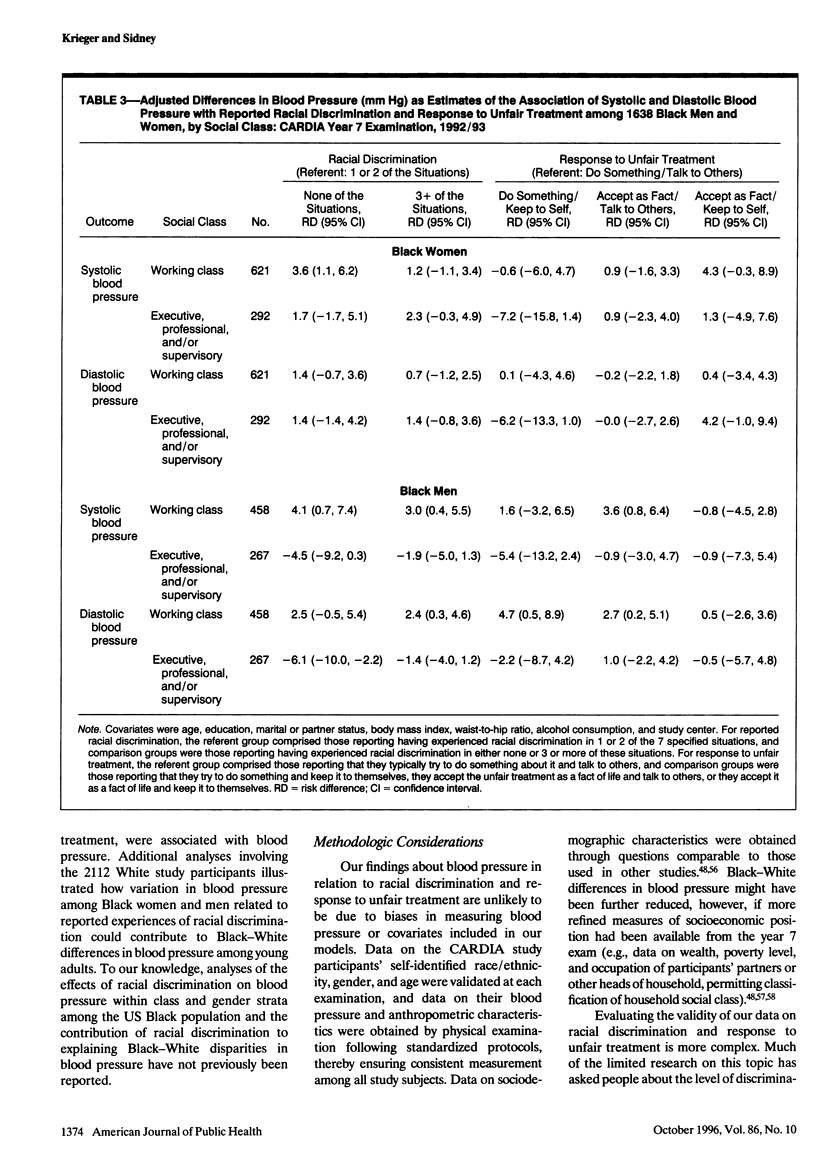
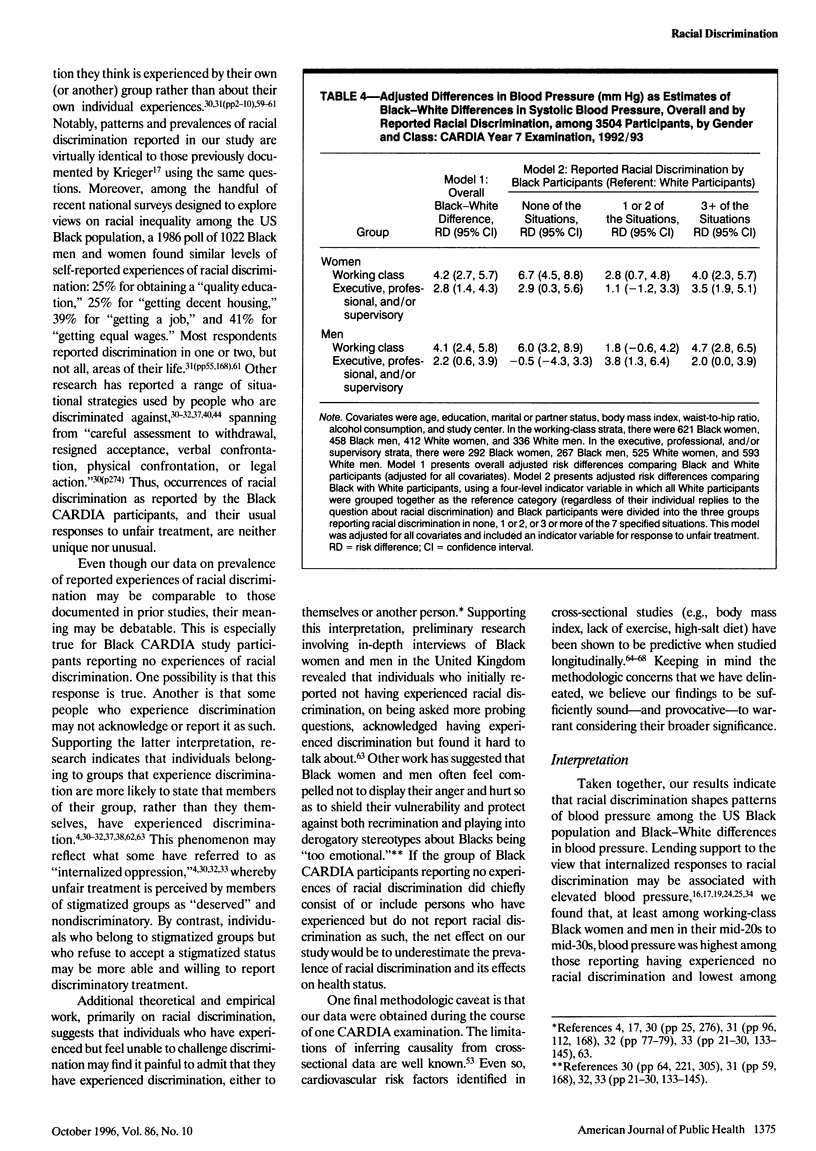
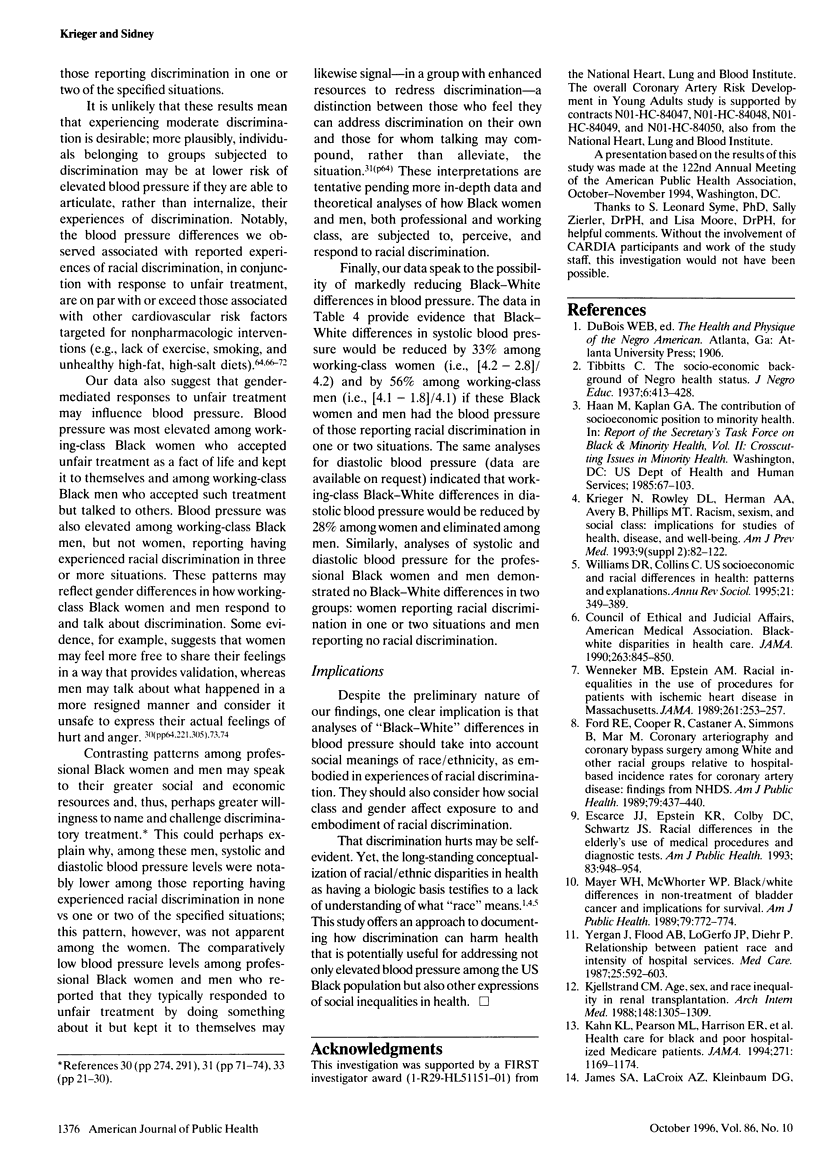
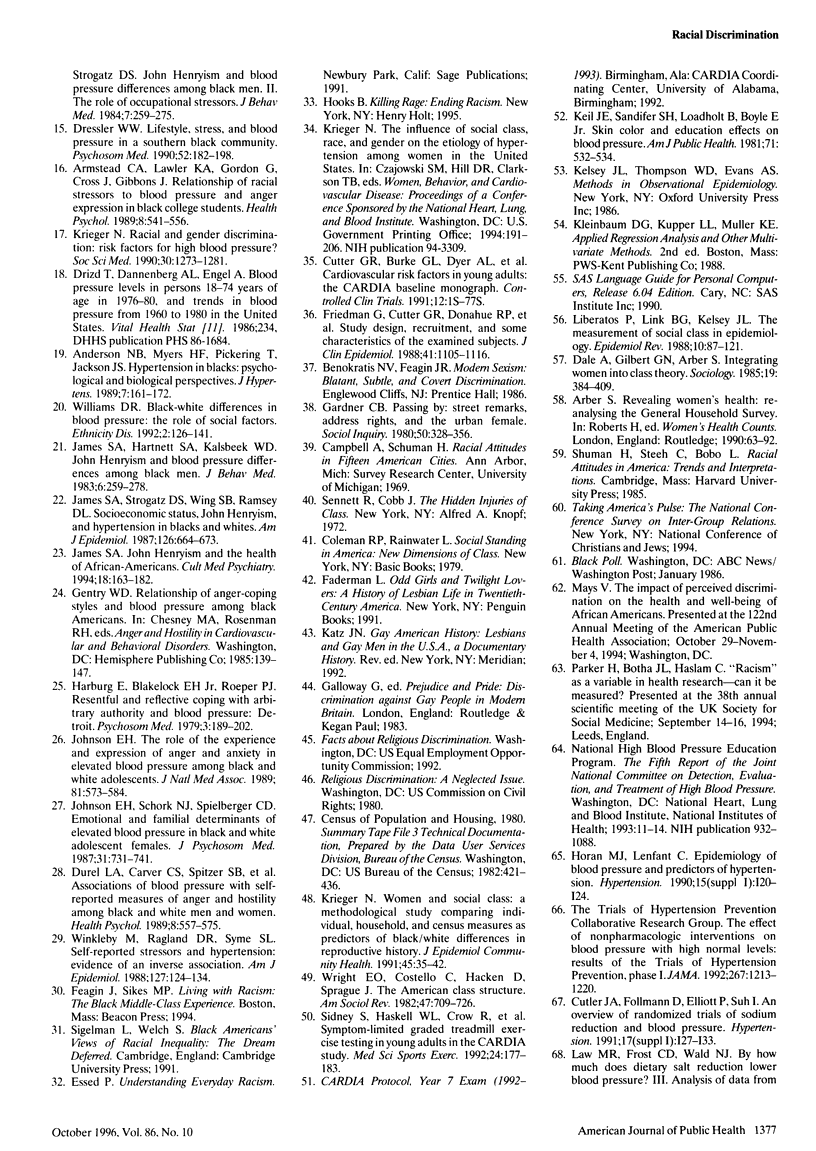
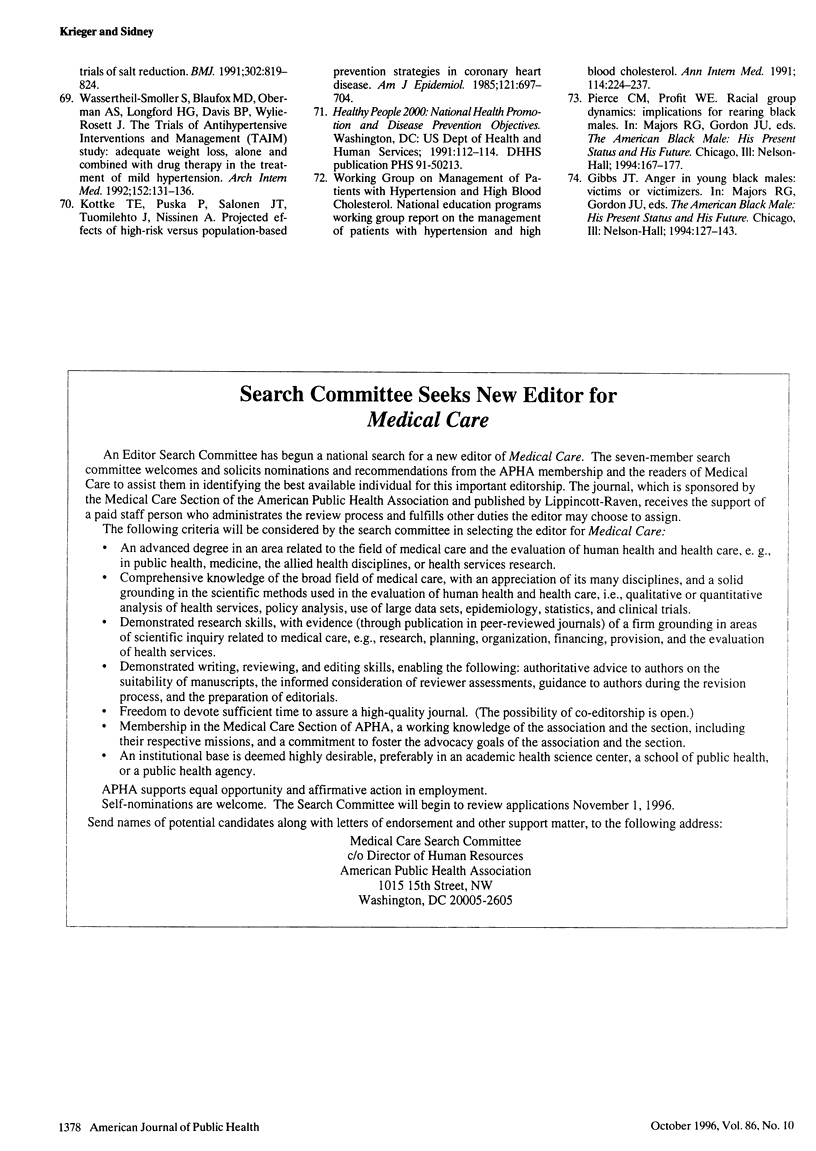
Selected References
These references are in PubMed. This may not be the complete list of references from this article.
- Anderson N. B., Myers H. F., Pickering T., Jackson J. S. Hypertension in blacks: psychosocial and biological perspectives. J Hypertens. 1989 Mar;7(3):161–172. [PubMed] [Google Scholar]
- Armstead C. A., Lawler K. A., Gorden G., Cross J., Gibbons J. Relationship of racial stressors to blood pressure responses and anger expression in black college students. Health Psychol. 1989;8(5):541–556. doi: 10.1037//0278-6133.8.5.541. [DOI] [PubMed] [Google Scholar]
- Cutler J. A., Follmann D., Elliott P., Suh I. An overview of randomized trials of sodium reduction and blood pressure. Hypertension. 1991 Jan;17(1 Suppl):I27–I33. doi: 10.1161/01.hyp.17.1_suppl.i27. [DOI] [PubMed] [Google Scholar]
- Dressler W. W. Lifestyle, stress, and blood pressure in a southern black community. Psychosom Med. 1990 Mar-Apr;52(2):182–198. doi: 10.1097/00006842-199003000-00006. [DOI] [PubMed] [Google Scholar]
- Durel L. A., Carver C. S., Spitzer S. B., Llabre M. M., Weintraub J. K., Saab P. G., Schneiderman N. Associations of blood pressure with self-report measures of anger and hostility among black and white men and women. Health Psychol. 1989;8(5):557–575. doi: 10.1037//0278-6133.8.5.557. [DOI] [PubMed] [Google Scholar]
- Escarce J. J., Epstein K. R., Colby D. C., Schwartz J. S. Racial differences in the elderly's use of medical procedures and diagnostic tests. Am J Public Health. 1993 Jul;83(7):948–954. doi: 10.2105/ajph.83.7.948. [DOI] [PMC free article] [PubMed] [Google Scholar]
- Ford E., Cooper R., Castaner A., Simmons B., Mar M. Coronary arteriography and coronary bypass survey among whites and other racial groups relative to hospital-based incidence rates for coronary artery disease: findings from NHDS. Am J Public Health. 1989 Apr;79(4):437–440. doi: 10.2105/ajph.79.4.437. [DOI] [PMC free article] [PubMed] [Google Scholar]
- Friedman G. D., Cutter G. R., Donahue R. P., Hughes G. H., Hulley S. B., Jacobs D. R., Jr, Liu K., Savage P. J. CARDIA: study design, recruitment, and some characteristics of the examined subjects. J Clin Epidemiol. 1988;41(11):1105–1116. doi: 10.1016/0895-4356(88)90080-7. [DOI] [PubMed] [Google Scholar]
- Harburg E., Blakelock E. H., Jr, Roeper P. R. Resentful and reflective coping with arbitrary authority and blood pressure: Detroit. Psychosom Med. 1979 May;41(3):189–202. doi: 10.1097/00006842-197905000-00002. [DOI] [PubMed] [Google Scholar]
- James S. A., Hartnett S. A., Kalsbeek W. D. John Henryism and blood pressure differences among black men. J Behav Med. 1983 Sep;6(3):259–278. doi: 10.1007/BF01315113. [DOI] [PubMed] [Google Scholar]
- James S. A. John Henryism and the health of African-Americans. Cult Med Psychiatry. 1994 Jun;18(2):163–182. doi: 10.1007/BF01379448. [DOI] [PubMed] [Google Scholar]
- James S. A., LaCroix A. Z., Kleinbaum D. G., Strogatz D. S. John Henryism and blood pressure differences among black men. II. The role of occupational stressors. J Behav Med. 1984 Sep;7(3):259–275. doi: 10.1007/BF00845359. [DOI] [PubMed] [Google Scholar]
- James S. A., Strogatz D. S., Wing S. B., Ramsey D. L. Socioeconomic status, John Henryism, and hypertension in blacks and whites. Am J Epidemiol. 1987 Oct;126(4):664–673. doi: 10.1093/oxfordjournals.aje.a114706. [DOI] [PubMed] [Google Scholar]
- Johnson E. H., Schork N. J., Spielberger C. D. Emotional and familial determinants of elevated blood pressure in black and white adolescent females. J Psychosom Res. 1987;31(6):731–741. doi: 10.1016/0022-3999(87)90022-5. [DOI] [PubMed] [Google Scholar]
- Johnson E. H. The role of the experience and expression of anger and anxiety in elevated blood pressure among black and white adolescents. J Natl Med Assoc. 1989 May;81(5):573–584. [PMC free article] [PubMed] [Google Scholar]
- Kahn K. L., Pearson M. L., Harrison E. R., Desmond K. A., Rogers W. H., Rubenstein L. V., Brook R. H., Keeler E. B. Health care for black and poor hospitalized Medicare patients. JAMA. 1994 Apr 20;271(15):1169–1174. [PubMed] [Google Scholar]
- Keil J. E., Sandifer S. H., Loadholt C. B., Boyle E., Jr Skin color and education effects on blood pressure. Am J Public Health. 1981 May;71(5):532–534. doi: 10.2105/ajph.71.5.532. [DOI] [PMC free article] [PubMed] [Google Scholar]
- Kjellstrand C. M. Age, sex, and race inequality in renal transplantation. Arch Intern Med. 1988 Jun;148(6):1305–1309. [PubMed] [Google Scholar]
- Kottke T. E., Puska P., Salonen J. T., Tuomilehto J., Nissinen A. Projected effects of high-risk versus population-based prevention strategies in coronary heart disease. Am J Epidemiol. 1985 May;121(5):697–704. doi: 10.1093/aje/121.5.697. [DOI] [PubMed] [Google Scholar]
- Krieger N. Racial and gender discrimination: risk factors for high blood pressure? Soc Sci Med. 1990;30(12):1273–1281. doi: 10.1016/0277-9536(90)90307-e. [DOI] [PubMed] [Google Scholar]
- Krieger N., Rowley D. L., Herman A. A., Avery B., Phillips M. T. Racism, sexism, and social class: implications for studies of health, disease, and well-being. Am J Prev Med. 1993 Nov-Dec;9(6 Suppl):82–122. [PubMed] [Google Scholar]
- Krieger N. Women and social class: a methodological study comparing individual, household, and census measures as predictors of black/white differences in reproductive history. J Epidemiol Community Health. 1991 Mar;45(1):35–42. doi: 10.1136/jech.45.1.35. [DOI] [PMC free article] [PubMed] [Google Scholar]
- Liberatos P., Link B. G., Kelsey J. L. The measurement of social class in epidemiology. Epidemiol Rev. 1988;10:87–121. doi: 10.1093/oxfordjournals.epirev.a036030. [DOI] [PubMed] [Google Scholar]
- Mayer W. J., McWhorter W. P. Black/white differences in non-treatment of bladder cancer patients and implications for survival. Am J Public Health. 1989 Jun;79(6):772–775. doi: 10.2105/ajph.79.6.772. [DOI] [PMC free article] [PubMed] [Google Scholar]
- Sidney S., Haskell W. L., Crow R., Sternfeld B., Oberman A., Armstrong M. A., Cutter G. R., Jacobs D. R., Savage P. J., Van Horn L. Symptom-limited graded treadmill exercise testing in young adults in the CARDIA study. Med Sci Sports Exerc. 1992 Feb;24(2):177–183. [PubMed] [Google Scholar]
- Wassertheil-Smoller S., Blaufox M. D., Oberman A. S., Langford H. G., Davis B. R., Wylie-Rosett J. The Trial of Antihypertensive Interventions and Management (TAIM) study. Adequate weight loss, alone and combined with drug therapy in the treatment of mild hypertension. Arch Intern Med. 1992 Jan;152(1):131–136. [PubMed] [Google Scholar]
- Wenneker M. B., Epstein A. M. Racial inequalities in the use of procedures for patients with ischemic heart disease in Massachusetts. JAMA. 1989 Jan 13;261(2):253–257. [PubMed] [Google Scholar]
- Williams D. R. Black-White differences in blood pressure: the role of social factors. Ethn Dis. 1992 Spring;2(2):126–141. [PubMed] [Google Scholar]
- Winkleby M. A., Ragland D. R., Syme S. L. Self-reported stressors and hypertension: evidence of an inverse association. Am J Epidemiol. 1988 Jan;127(1):124–134. doi: 10.1093/oxfordjournals.aje.a114772. [DOI] [PubMed] [Google Scholar]
- Yergan J., Flood A. B., LoGerfo J. P., Diehr P. Relationship between patient race and the intensity of hospital services. Med Care. 1987 Jul;25(7):592–603. doi: 10.1097/00005650-198707000-00003. [DOI] [PubMed] [Google Scholar]


